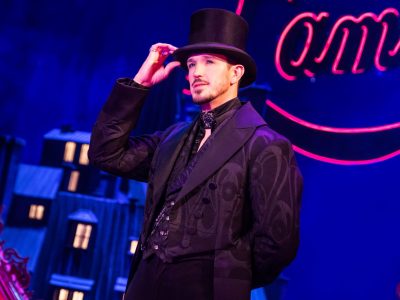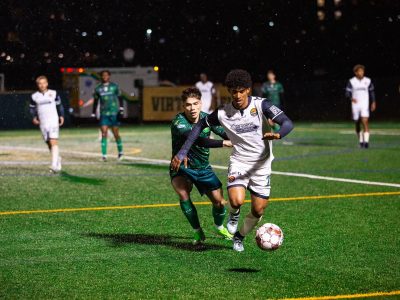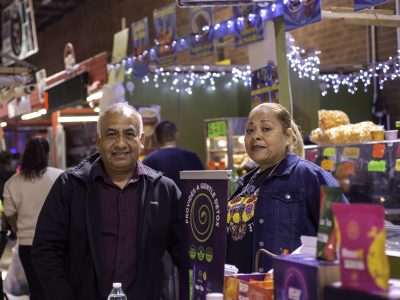Rob Davis, the new executive director for RiverRun International Film festival, discusses classic movies, film scores, Spain, Alfred Hitchcock and Pokémon Go!
Triad City Beat: Currently living in Fort Lauderdale, how do you think you will survive being hours from the nearest beach?
Rob Davis: Well, the thing about it is that when actually you live here you don’t have as much time to be near or on water as much as you would like. Especially when you are busy with your work. Plus, I grew up in Tennessee, so while I was near rivers and lakes I spent a lot of time not being in close proximity to the water as I have been these last few years.
TCB: So you were raised in Tennessee. Are you from Tennessee?
RD: I was born in Ohio but I really grew up in what is known as middle Tennessee.
TCB: What prompted you to apply for position of executive director for RiverRun?
RD: I have always had a great passion for film. All types of film. Documentaries, narratives, independent films, large studio films. The positions I have enjoyed most in my career have been the ones in which I was working with film.
TCB: How did you get involved with film?
RD: I always had an interest in it as far back as junior high school.
TCB: How did you enjoy teaching an international film course in Spain?
RD: That was fascinating. I had gone to Spain and done a very short seminar that I had thoroughly enjoyed. I was then invited back to teach a course and deliver it to an international student body. I did some unique things with students outside of the classroom. For instance, we spent one day with the head of Warner Brothers in Madrid. They were getting ready to launch one of the Harry Potter films and so he explained the difference between marketing a Harry Potter film to the United States versus the Spanish audience. And then later the students were able to participate in a preview screening to see how they polled the audience.
TCB: And the NYU Alfred Hitchcock Centennial Conference?
RD: I have always considered Alfred Hitchcock one of the master film makers. I wanted to do something different. My seminar was entitled “Alfred Hitchcock: Master of Suspense. Master of Marketing”. I discussed how Hitchcock, more than other directors of that time, was involved in the marketing, promotion and publicity of his films to a much greater extent. It was one of the highlights of my career. So many people he worked with over the years were there. Janet Lee. Eva Marie Saint. Teresa Wright. Several of his writers.
TCB: What is best movie you ever saw during your work with film festival?
RD: There have been many. I have seen so many films that have been exceptional in so many ways. I was serving on the documentary jury of the Palm Beach International Film Festival. That particular year a film won called The Dessert of Forbidden Art. An extremely well done documentary.
Once, I was judging a student film festival and there was this wonderful 20-minute narrative film by this student from NYU. Even though it was a short it was so incredibly well made that I have remembered it for over 15 years.
The combination of telling the story plus the attention to period detail this film student had put into was another one of those examples what film making is all about and the power of film.
TCB: What speaks to you when you are watching a film?
RD: I feel a connection to a film to the point that I am sad when the film ends, even if there is a resolution to the film. I focus on the storytelling of a film. The ability to get the audience member involved in the story to the extent that they really care about what is happen and what the outcome will be.
TCB: Favorite part of working with a film festival?
RD: There comes a time at the end of an event or the conclusion that you realize the hard work of you and your team has paid off and you deliver to your audience a very satisfy and rewarding experience. There is an immense satisfaction that you and your team has done that.
TCB: What called out to you about North Carolina?
RD: When I got to Winston my first night I took a walk around town and talked to the residents and I realized then that that was a part of the country that I would enjoy living.
TCB: When you are not working, if that ever happens, what are your hobbies?
RD: I love to travel and in addition to seeing new places I love going to towns were movies were made in the ’50s and ’60s when Hollywood was just beginning to go on location. And I like to see what those locations look like today and find people who were there when the movie was made and hear them talk about it with the same excitement 50 years later. I went to Maine see where Peyton Place was filmed and to Kentucky for the 50th anniversary of the film Raintree County.
I also like long walks, reading, writing about classic films, and restoring old furniture from time to time.
TCB: In your opinion, what movie is an example of a well-made film that will endure the test of time?
RD: Black Narcissus is one of the finest color films ever made. The way they used color and recreated the setting without being on location is pretty magnificent. I do think that film has endured over the years and will continue to do so.
TCB: Is music one of your passions like film is given you worked with Classical South Florida Media group?
RD: Yes. I still have my vinyl collection and I have an old 1950 RCA record player; a Victrola before they discontinued the name. And it still works.
TCB: What is your favorite film score?
RD: One of my favorites is the score from the original production of Lolita.
TCB: And last but not least, I must ask you, are you playing Pokémon Go? And if so what team are you on?
RD: (Laughing) No, I must confess that I am not. I’m following it on the news quite closely and with a lot of interest. The local hospital in a very small town near where I am from in Tennessee has issued a news release today asking for players to please respect that the parking has limited spaces.
Join the First Amendment Society, a membership that goes directly to funding TCB‘s newsroom.
We believe that reporting can save the world.
The TCB First Amendment Society recognizes the vital role of a free, unfettered press with a bundling of local experiences designed to build community, and unique engagements with our newsroom that will help you understand, and shape, local journalism’s critical role in uplifting the people in our cities.
All revenue goes directly into the newsroom as reporters’ salaries and freelance commissions.





Leave a Reply